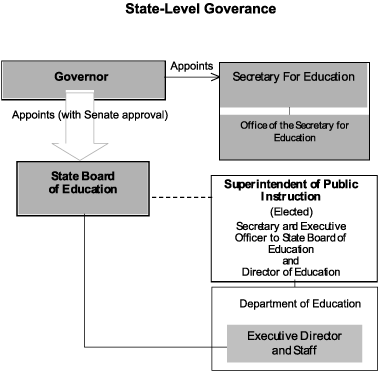
California Education Dialogue
A public policy dialogue produced by Information Renaissance
with support from The William and Flora Hewlett Foundation,
IBM Corporation and Intel Corporation
|
Current K-12 Education Governance in CaliforniaGovernance for K-12 education in California can be seen as having three levels:
There are many relationships among these levels, but it is important to note that the structure is not hierarchical. An overview of state-level governance is given in the chart and list below. County offices provide direct administrative services for small school districts (about one third of all districts), including for example payroll services. County offices also provide programmatic assistance and fiscal oversight to all districts. In addition, they operate specialized programs for certain groups of students, such as those in juvenile court schools. Local school districts provide centralized administration for their school sites. They apportion funding, and typically handle issues such as expulsions and salary schedules. Some examples of relationships between districts and a county office of education: a county office may maintain a curriculum library used by administrators and teachers in the districts in that county; county offices are sometimes the direct providers of special education. The relationships between districts and county offices depend greatly on the districts and county offices involved. 
Functions
Additional Government Entities that make or impact
Legislature |